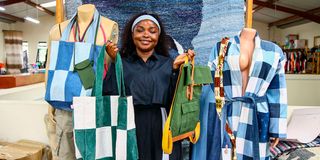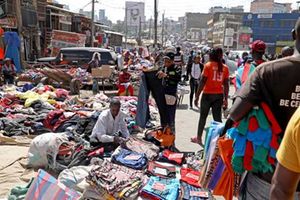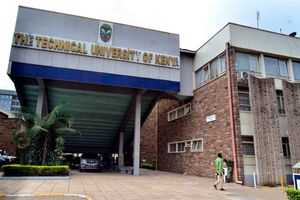
Some of the clothes and bags that Africa Collect Textiles Foundation creates using secondhand garments.
Several years ago, while working for a company that collected used garments in the Netherlands for sale as second hand clothes in countries such as Kenya, Elmar Stroomer and Alex Musembi discovered a problem.
Whereas advanced economies such as the Netherlands had ready markets for their textile waste, countries that imported second hand clothes did not have elaborate textile waste management infrastructure.
“Netherlands had more than 10, 000 collection points for people to drop off their used garments, but Kenya, whose population is three times more, had less than 100,” said Stroomer in an interview with Powering SMEs.
With no proper waste management structure in place, most of the garments that were discarded after being worn in Kenya eventually ended up in landfills, or worse, in water bodies that supported life.
Additionally, although global garment manufacturers paid taxes to manage textile waste in the countries they operated, countries in Africa, which actually received this waste, did not receive any of the money raised.
“Discussions abroad were beginning to center around creating circular economies, but I knew that global trade could never become circular unless we protected the recipients of the waste,” explained Stroomer.
In 2013, driven by an aspiration to resolve this challenge for the countries that imported second hand clothes, the duo started a side hustle dubbed Africa Collect Textiles (ACT) that would upcycle used garments.
The vision they had was noble, but getting an investor to believe that they could actually manage to build a sustainable enterprise out of a problem that is systemic, then support them financially, was not easy.
“At first, we had challenges in raising funding because a lot of investors thought we were odd. They didn’t see the economic value in collecting textile waste in a country that had so many second hand clothes,” posed Stroomer.
Indeed, the founders themselves knew that they had low chances of success, but based on their calculations, they believed that if they could upcycle a certain amount of clothes, then the business could become profitable.
Their conviction and persistence saw them secure their first funding in 2020, just when the Covid-19 pandemic had struck, which they used to grow their collection network and purchase new machinery.
“We entered into an agreement with collection partners such as universities and shopping malls, who would reserve some space in their premises for us to put collection bins,” explained Stroomer.
Currently, ACT has installed 42 collection points in establishments that attract huge human traffic. The company encourages people to drop off the clothes which they no longer use in these designated bins.
“It doesn’t matter whether they are wearable or not, all we ask is for people to donate their clothes clean and dry, if they are wet, oily or stained that becomes waste and it has to be discarded,” said Stroomer.
Support sustainable development
If they are still wearable, the company puts the clothes in mitumba bales, which they supply to women groups in markets that sell second hand clothes, at a price that is way lower than that of imported bales.
If they are unwearable, the company upcycles the garments into items such as backpacks, rugs, baskets and toys at their warehouse in Baba Dogo Ruaraka. They then sell the final product to markets in the Netherlands, United Kingdom and Germany, as well as in local shops.
“In a sense, we are taking back the mtumba to where it came from, but now we are selling it in better shape than it was when it came,” remarked Stroomer.
Offcuts from industries and unsellable mitumba from markets such as Gikomba also make up for a portion of the raw materials they use for upcycling. The company also sources its raw materials from security companies in need of a safe and secure way to get rid of their waste.
“If security uniforms fall into the wrong hands, it could be a disaster, that’s why security companies burn garments that are no longer in use, but this is not good for the environment. What we do is we take off logos, make the uniforms unwearable, then upcycle,” said Stroomer.
The company also upcycles textile waste for select companies into their product of choice and donates part of the proceeds of this venture to an orphanage that they support.
“Orphanages get a lot of clothing donations, which is a great gesture of course, except they may not be very useful to orphanages. Many of these clothes end up being used or sold by the workers,” said Stroomer.
“What an orphanage needs is money. An orphanage can only take in more children when it has sufficient resources to give them food, take them to hospital and pay school fees,” he added.
Since not many people know about their business model, at the moment, ACT only processes about 3,000-4,000 kilograms of textile waste in a month.
Through partnerships with like-minded organisations such as the Kenya Climate Innovation Center that support sustainable development, the company hopes to increase the amount they process to more than one million kilograms within the next three years.
By upcycling more textile waste, the company, which currently employs 22 staff, will be able to leverage economies of scale to deliver more affordable products, as well as transition from relying on grants to becoming self-reliant.
“Pricing has been an issue for us because people believe that since our raw materials are free, our products should be cheap. At the moment, that isn’t the case, but if we can grow our capacity, then our products will become more mainstream,” said Stroomer.
The company is also pushing to have Extended producer responsibility (EPR) fees, which are paid by companies that produce garments, reach countries in Africa, that actually manage the textile waste produced.
“Many countries abroad require brands to pay a certain tax for facilitating proper disposal of the garments they sell. This tax needs to travel to the countries that import second hand clothes because that is where the end of life happens,” said Stroomer.





